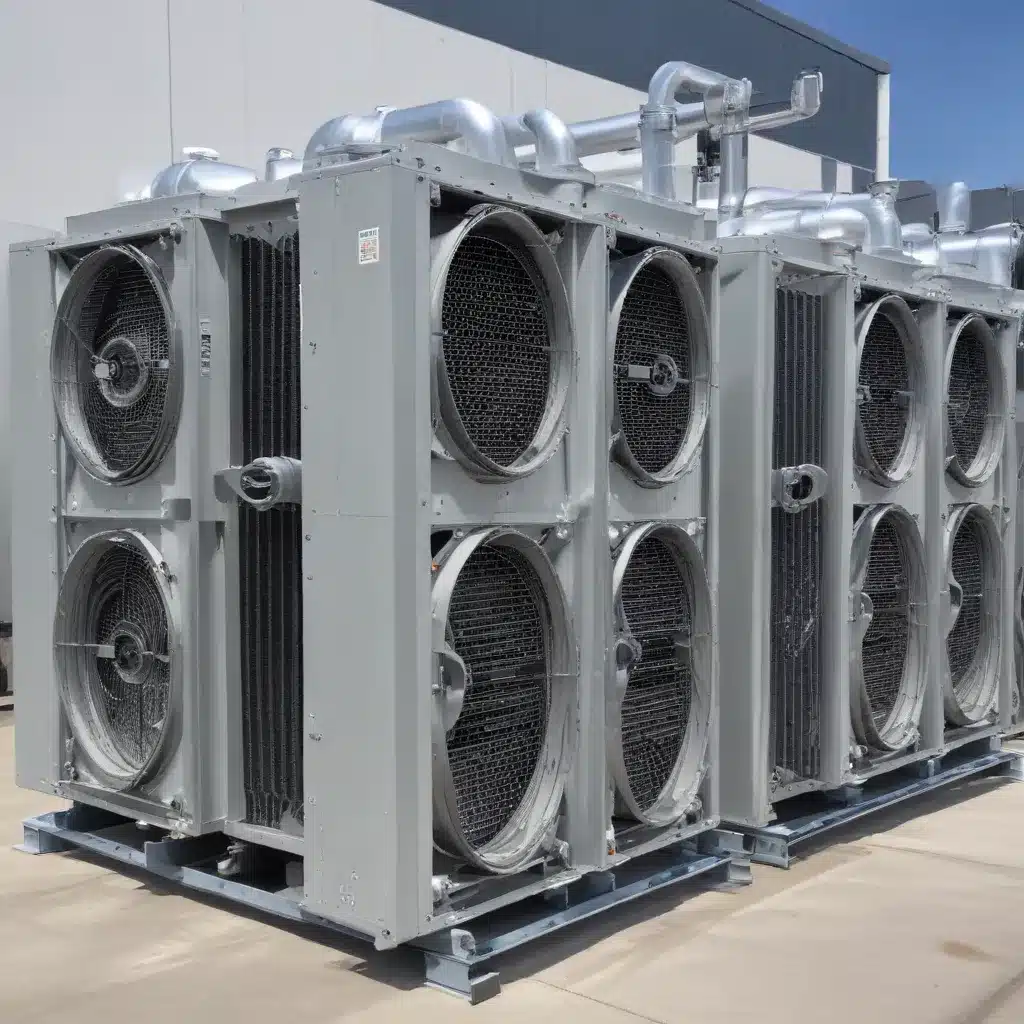
Unlocking the Full Potential of Air-Cooled Heat Exchangers
Air-cooled heat exchangers have long been the backbone of industrial cooling systems, providing a reliable and efficient means of transferring heat from various processes. However, as environmental concerns and water scarcity become increasingly pressing issues, the need to enhance the performance and sustainability of these critical components has never been more urgent. Through the integration of innovative hybrid cooling technologies, air-cooled heat exchangers can now unlock unprecedented levels of efficiency, ushering in a new era of energy-conscious and water-wise industrial operations.
The Challenges of Conventional Air-Cooled Heat Exchangers
Conventional air-cooled heat exchangers, while widely utilized, face several inherent limitations that can hinder their overall performance and efficiency. These challenges include:
-
Limited Cooling Capacity: Air-cooled heat exchangers rely solely on the ambient air temperature to dissipate heat, which can be insufficient during periods of high ambient temperatures or in hot climates. This can lead to reduced heat transfer rates and diminished system performance.
-
Water Consumption Concerns: Traditional wet-cooling systems, such as cooling towers, can consume significant amounts of freshwater, an increasingly scarce resource in many regions. This raises concerns about the sustainability and environmental impact of these systems.
-
Operational Complexities: Maintaining optimal performance of air-cooled heat exchangers can be challenging, requiring meticulous attention to factors like fin fouling, air flow obstructions, and equipment degradation over time.
Embracing Hybrid Cooling Systems: A Game-Changing Approach
To address these limitations and unlock the full potential of air-cooled heat exchangers, innovative hybrid cooling systems have emerged as a transformative solution. These hybrid systems seamlessly combine the advantages of air-cooled and water-cooled technologies, creating a synergistic approach that enhances overall efficiency and adaptability.
Integrating Hybrid Cooling Technologies
Hybrid cooling systems typically incorporate one or more of the following technologies to complement the air-cooled heat exchanger:
-
Evaporative Cooling: By introducing a small amount of water into the air stream, evaporative cooling can significantly lower the air temperature entering the heat exchanger, improving its heat transfer capacity. This hybrid approach can effectively address the limitations of conventional air-cooled systems during hot weather conditions.
-
Thermal Energy Storage: The integration of phase-change materials or other thermal storage solutions can help mitigate the impact of peak cooling demands. These systems can store excess heat during periods of low demand and release it when needed, optimizing the overall system efficiency.
-
Waste Heat Utilization: Hybrid systems can leverage waste heat from various industrial processes to drive cooling, further improving the overall energy efficiency of the system. This can be achieved through the integration of absorption chillers or other waste heat recovery technologies.
-
Water Recirculation and Recycling: Hybrid systems can incorporate water recirculation and treatment technologies to minimize freshwater consumption, making them a more sustainable option in water-stressed regions. This can include the use of degraded or recycled water sources, such as municipal wastewater or industrial process water.
Enhancing Performance and Reliability
The incorporation of these hybrid cooling technologies into air-cooled heat exchanger systems can yield a multitude of benefits:
-
Improved Cooling Capacity: By leveraging evaporative cooling or thermal energy storage, hybrid systems can enhance the heat transfer capabilities of air-cooled heat exchangers, particularly during periods of high ambient temperatures.
-
Reduced Water Consumption: The integration of water recirculation and recycling technologies can significantly decrease the freshwater requirements of the cooling system, making it a more sustainable and environmentally friendly option.
-
Increased Energy Efficiency: The utilization of waste heat recovery and other energy-saving technologies can optimize the overall energy consumption of the cooling system, leading to substantial cost savings and environmental benefits.
-
Enhanced Reliability and Resilience: Hybrid systems often exhibit greater operational flexibility and adaptability, allowing them to maintain consistent performance even under challenging environmental conditions or equipment malfunctions.
Advancing the Future of Air-Cooled Heat Exchanger Technology
The integration of hybrid cooling systems into air-cooled heat exchanger applications is a transformative step forward in the quest for more efficient, sustainable, and resilient industrial cooling solutions. By leveraging the complementary strengths of air-cooled and water-cooled technologies, these innovative systems are poised to become the new standard in the industry.
As the global focus on environmental stewardship and resource conservation continues to intensify, the adoption of hybrid cooling systems for air-cooled heat exchangers will become increasingly crucial. These advancements not only address pressing concerns about water usage and energy efficiency but also pave the way for a future where industrial processes can operate in a more environmentally responsible manner without sacrificing performance or reliability.
Conclusion: Embracing the Future of Air-Cooled Heat Exchanger Technology
The future of air-cooled heat exchanger technology lies in the seamless integration of hybrid cooling systems. By harnessing the power of evaporative cooling, thermal energy storage, waste heat utilization, and water recirculation, these innovative solutions are poised to redefine the standards of industrial cooling. As the industry navigates the challenges of environmental sustainability and resource conservation, the adoption of hybrid cooling technologies will be a pivotal step towards a more efficient, resilient, and eco-friendly industrial landscape.
For air-cooled heat exchanger users and designers, the implementation of these hybrid systems represents a significant opportunity to enhance the performance, reliability, and sustainability of their cooling operations. By staying at the forefront of this technological evolution, they can position themselves as industry leaders, driving the future of air-cooled heat exchanger technology and setting a new benchmark for environmental stewardship.

